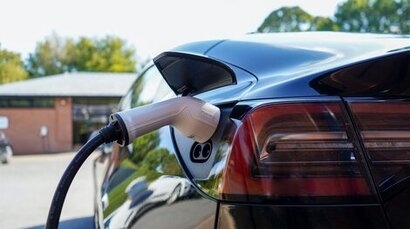
Analysis of 200 UK-based, fleet-owning businesses with a turnover in excess of £1 million by Centrica Business Solutions illustrates that demand for electric vehicles (EVs) by business customers is skyrocketing, with 62 percent saying that they expect to operate a fully electric fleet within the next four years.
Individual ownership of EVs has surged during the last year, but a significant number of UK road users are those employed by delivery and courier fleets.
This is particularly true in urban areas: the World Economic Forum’s “The Future of the Last-Mile Ecosystem” report shows that by 2030, there could be 36 percent more delivery vehicles in inner cities and that without intervention now, this could cause a 32 percent increase in carbon emissions within a decade.
However, despite this positive development, two-thirds of businesses surveyed said they were worried about accessing public charging points, and as a result, 48 percent have already installed charging infrastructure on their own premises and 36 percent are planning to invest in on-site charging infrastructure in the next 12 months.
Businesses have the right idea in investing in on-site charging infrastructure; however, concerns about publicly accessible charge points are misguided, argues Aidan McClean, CEO and co-founder of Ufodrive and bestselling author of Electric Revolution: Myths & Truths about Electric Vehicles and Climate Disaster Instead, says Mr McClean, fleet managers should be more concerned about effective management software that optimises charging schedules, effectively manages battery health, and offers more accurate analyses in addition to understanding route data and driving style.
“I am thrilled to see corporate fleets starting to embrace EVs – as they are running out of time; both in an ecological sense and before the UK’s 2030 ban on the production of new internal combustion engines” said Mr McClean. “Furthermore, electrifying fleets will continue to be seen as an ‘easy win’ in meeting businesses’ net zero ambitions. However, despite these positive numbers, it’s clear that many people still fail to adopt the EV mindset which is necessary for adoption. Concerns about ‘range anxiety’, particularly by fleet managers and their drivers, are understandable - but misplaced. Treating EVs the same as fossil fuel-driven vehicles is an oversight; with a busy day’s work ahead or with routes to finish, no one has time to sit and wait for their electric van to charge while on the job as we would at the ‘gas’ pump.
Instead, adds McClean, they need to be confident that every day’s work will begin with a full battery, and that software will manage the charging schedule of each vehicle as well as the fleet at large. This means fleet managers need efficient software that prioritises vehicles that need to charge the most while they are parked at the company depot. Furthermore, there is a significant lack of data around EVs. This refers to things like how driving style and routes realistically affect range, as well as real-time data about which chargers are accessible and working. If a driver does need to make a charging stop, which shouldn’t be often, they need to know where chargers are on their journey, which one’s work, and which ones they can access.”
“The general population is already mentally prepared to adopt EVs” said McClean. “After all, most charge their phone overnight, and wouldn’t necessarily include a full-charge ‘pitstop’ in their day-to-day work – especially if someone is out and about and not parked in one place for a long time. We must adopt this same mindset to EVs – and it is no different for fleet managers, except they have many chargers to balance; here, smarter, better software is essential.”
For additional information:

